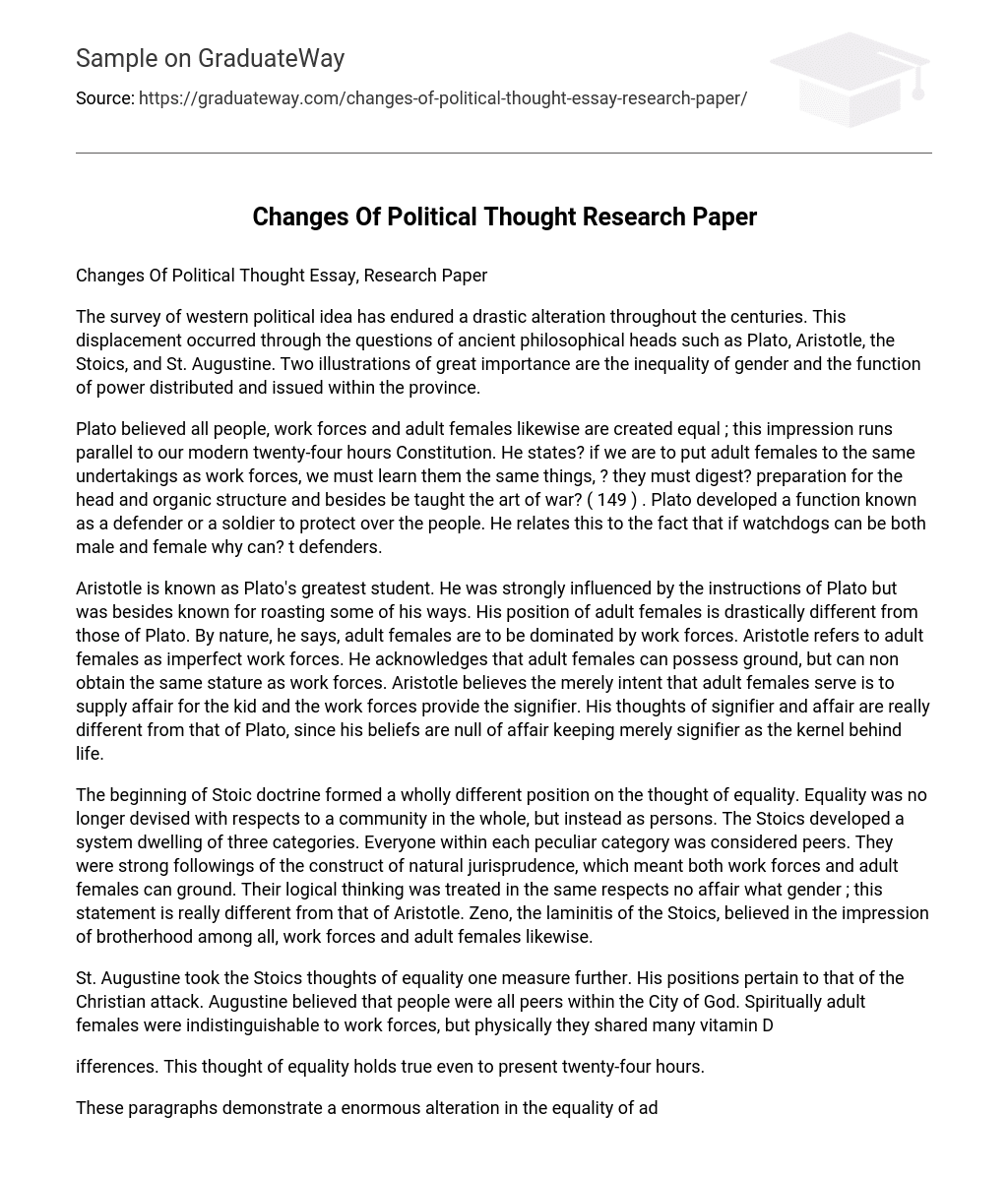Changes Of Political Thought Essay, Research Paper
The survey of western political idea has endured a drastic alteration throughout the centuries. This displacement occurred through the questions of ancient philosophical heads such as Plato, Aristotle, the Stoics, and St. Augustine. Two illustrations of great importance are the inequality of gender and the function of power distributed and issued within the province.
Plato believed all people, work forces and adult females likewise are created equal ; this impression runs parallel to our modern twenty-four hours Constitution. He states? if we are to put adult females to the same undertakings as work forces, we must learn them the same things, ? they must digest? preparation for the head and organic structure and besides be taught the art of war? ( 149 ) . Plato developed a function known as a defender or a soldier to protect over the people. He relates this to the fact that if watchdogs can be both male and female why can? t defenders.
Aristotle is known as Plato’s greatest student. He was strongly influenced by the instructions of Plato but was besides known for roasting some of his ways. His position of adult females is drastically different from those of Plato. By nature, he says, adult females are to be dominated by work forces. Aristotle refers to adult females as imperfect work forces. He acknowledges that adult females can possess ground, but can non obtain the same stature as work forces. Aristotle believes the merely intent that adult females serve is to supply affair for the kid and the work forces provide the signifier. His thoughts of signifier and affair are really different from that of Plato, since his beliefs are null of affair keeping merely signifier as the kernel behind life.
The beginning of Stoic doctrine formed a wholly different position on the thought of equality. Equality was no longer devised with respects to a community in the whole, but instead as persons. The Stoics developed a system dwelling of three categories. Everyone within each peculiar category was considered peers. They were strong followings of the construct of natural jurisprudence, which meant both work forces and adult females can ground. Their logical thinking was treated in the same respects no affair what gender ; this statement is really different from that of Aristotle. Zeno, the laminitis of the Stoics, believed in the impression of brotherhood among all, work forces and adult females likewise.
St. Augustine took the Stoics thoughts of equality one measure further. His positions pertain to that of the Christian attack. Augustine believed that people were all peers within the City of God. Spiritually adult females were indistinguishable to work forces, but physically they shared many vitamin D
ifferences. This thought of equality holds true even to present twenty-four hours.
These paragraphs demonstrate a enormous alteration in the equality of adult females within society. Another illustration that was greatly impacted by these clip periods was the alteration in the function of power distributed and issued within the province.
Plato held the belief of the philosopher male monarch. He believed to guarantee the ideal province? either philosophers ( were to ) go male monarchs in their states or those who are now called male monarchs and swayers come to be sufficiently inspired with a desire for wisdom? ( 179 ) . Plato believed merely the wise could put to death proper justness. A merely metropolis is an ideal metropolis for Plato, one in which the philosopher was in entire control.
Aristotle’s positions greatly differ from Plato? s. Aristotle believed that each person in their ego made the polis. He compares holding merely one individual as a? manus? ( 112 ) without a organic structure, put that manus with the remainder of the organic structure and it can work to its fullest potency. This describes persons working as a whole to break the polis. By including all citizens Aristotle believed he had created the ideal metropolis.
During the clip of the Stoics, many of import philosophers gave their sentiments about the issues of authorization within the province. As stated antecedently, Zeno was a strong truster of the brotherhood among all. The Stoics impression of natural jurisprudence granted all people within the province, of any category, to be offered the ability to portion their sentiment of authorities. Another philosopher, Polibius, agreed with Aristotle’s construct of assorted fundamental law.
Government was bit by bit traveling off from the yearss of Plato.
Augustine defined the Christian regulation of the Church over province. In order to hold the ideal authorities, Augustine believed jurisprudence should co-relate to that of the Church. He believed foremost that the province should advance peace and prosperity among the people. Second, that it should reflect merely true faith. Last, the authorities should work to set up normally recognized regulations for geting the necessities of life. God has doctrine over adult male, hence ; he has philosophy over province.
After much reading for this study, I realized the major impact these philosophers have had both in equality and province over the states of today. This shows that at one clip certain authoritiess or rights were at there premier, but as clip progresses things alteration. One thing will ever stay and that is the impact of faith over society.





